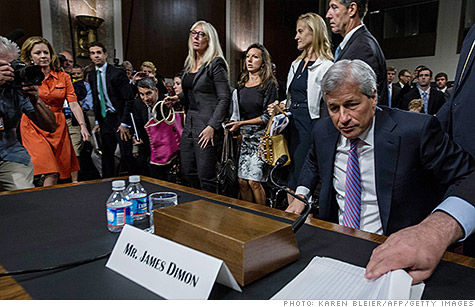Search News

JPMorgan Chase CEO Jamie Dimon told a Senate panel that his firm might claw back pay of bankers involved in the trading loss.
WASHINGTON (CNNMoney) -- JPMorgan Chase CEO Jamie Dimon said Wednesday that risky financial bets resulting in more than $2 billion in losses will "likely" lead to clawbacks of senior banker pay -- a rare occurrence on Wall Street.
Testifying at a Senate Banking hearing, Dimon said that clawbacks would be invoked as an internal corporate policy and would be a first for JPMorgan Chase (JPM, Fortune 500).
JPMorgan would also be only the second major investment bank to disclose such a high profile clawback. In February, Swiss-based UBS announced plans to take back pay of those involved in a rogue trading scandal that lead to $2 billion in losses for the bank last year. Requests to confirm the UBS recoupment actually took place were not immediately returned.
During the financial crisis, lawmakers and compensation czars pledged to claw back bonuses paid at Wall Street banks that taxpayers bailed out. Despite the creation of a special government czar tasked with watching bank CEO pay, who promised to look into claw backs, not a single dollar of compensation was returned.
Even Jamie Dimon says that was wrong.
"I think that one of the legitimate complaints was that after the crisis a lot of people walked away from companies that went bankrupt with a lot of money. Some of that was inappropriate," he said.
JPMorgan is among several big Wall Street banks, including Citigroup (C, Fortune 500), Morgan Stanley (MS, Fortune 500), and Goldman Sachs (GS, Fortune 500), that have announced new clawback policies in recent years. The clawbacks target pay to employees who put the banks in big financial or legal trouble.
Dimon said JPMorgan's clawback policy targets senior employees and can be invoked for "bad judgment."
"We can claw back any unvested stock. We can even claw back things like cash bonuses. So, it's pretty extensive, the ability to claw back," Dimon said.
Dimon didn't spell out whose salary would be targeted. But most observers expect that first on the list is Chief Investment Officer Ina Drew, who retired from the company after the bad trades were disclosed.
One of the highest-paid women in the financial industry, Drew made $15.5 million in 2010. She spent more than 30 years at JPMorgan and is in line to receive $14.7 million severance in the form of stock, $2.6 million in pension benefits and almost $10 million in deferred compensation.
However, some -- including Vineeta Anand, chief research analyst in the Office of Investments at the AFL-CIO -- believe Dimon himself should also face a clawback.
In the hearing, Dimon made it clear that he did not, personally, approve Drew's "trading strategy," saying he was merely "aware" of it, possibly setting up his own defense.
"Frankly, it shouldn't be the CIO, the buck stops at the CEO desk," said Anand, who specializes in compensation issues. "What nobody asked is: Mr. Dimon, how much of your pay are you going to forfeit?"
Clawbacks of CEO pay are rare, not just on Wall Street but throughout Big Business. In 2002, a new law allowed regulators to go after CEO and chief financial officer pay when bad or fraudulent financial disclosures were submitted.
So far, the Securities and Exchange Commission has only pursued about a dozen cases, compensation experts say. In 2009, however, the SEC started getting more aggressive in a few cases, even pursuing CEOs and CFOs who weren't accused of misconduct in submitting the faulty financial documents. ![]()